Man Utd: What is the problem with Paul Pogba - and what is the solution?
- Published
- comments

Paul Pogba has been getting a lot of criticism recently but, if I am ever negative about him, it is only because he is such a wonderfully gifted player that I want to see him do so much more.
Although the £89m Manchester United midfielder has not been making or scoring the goals I would expect from him in the past few weeks, that is partly down to the role he has been asked to play and the players who are around him.
United manager Jose Mourinho needs balance in his team and he is still trying to find his best XI.
Mourinho has got so much attacking talent that sometimes Pogba is asked to play deeper, and he has also had to build a new relationship with Alexis Sanchez since the Chile international joined United from Arsenal in January.
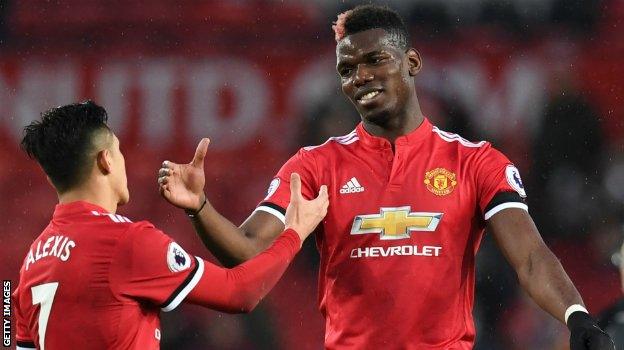
Paul Pogba (right) had the best ratio of assists to minutes played of any player in Europe's top five leagues (one every 126 minutes) before Alexis Sanchez's arrival, but has not managed another assist since and has slipped to fifth place. He was ranked 18th in the Premier League for chances created per 90 minutes before Sanchez joined (2.14) but is now down in 40th (1.73).
Pogba has had to work out what Sanchez is going to do when he cuts inside, and where he fits into that, and learn how to adapt his game and find his own space.
All of that has affected the impact the France international has had on matches, not just with his goals and assists, but with his shots and the number of chances he has created.
He has only made one chance for a team-mate in the six games he has played since Sanchez signed on 22 January, a short pass inside the area to set up Marcus Rashford (who shot wide) in the 87th minute against Sevilla.
That was Pogba's only touch in the Sevilla box, and it came after Sanchez had been replaced by Rashford.
Paul Pogba - before and after Sanchez's arrival at Man Utd in all competitions | ||
|---|---|---|
Before Sanchez (up to 22 Jan) | 2017-18 | With Sanchez (since 22 Jan) |
20 (1,669) | Games played (minutes) | 6 (407) |
3 | Goals | 0 |
10 | Assists | 0 |
38 | Chances created | 1 |
2.05 | Chances created/90 min | 0.22 |
58 | Shots | 9 |
3.13 | Shots/90 min | 1.99 |
3.67 | Touches in opp box/90 min | 2.21 |
Mourinho sending out message - but not just to Pogba
Mourinho dropped Pogba for the first leg of their Champions League tie with Sevilla, but I am not sure what the manager's motivation was with that decision.
Pogba is United's best midfielder and he was also straight back in the starting XI for their next game.
It was a kick up the backside, like many people said, but not just for Pogba. I don't think it was about getting more out of him, because he would have cracked on anyway.
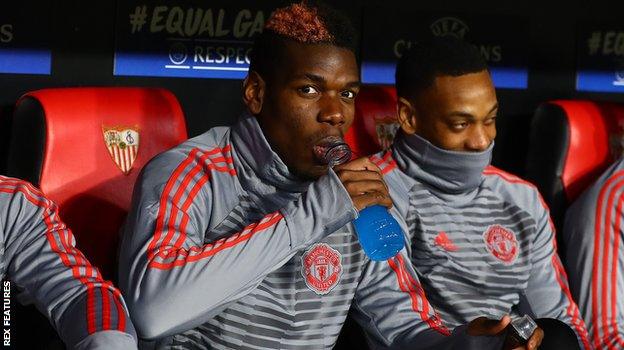
Pogba was named on the bench for the first leg of United's Champions League tie against Sevilla. Manager Jose Mourinho picked a midfield of Ander Herrera, Nemanja Matic and Scott McTominay.
Sometimes as a manager you make an example of a player to show the others that everyone has to chip in and do the job they are told, not the job they want to do.
I have had managers say to me in the past that, because I was a senior player, they were going to criticise me in a team meeting because, if I could get it, then the other players would have to take it as well. I was just asked to take it nicely on the chin.
We don't know why Mourinho put Pogba on the bench in Spain but he might have said to him that he is doing it to send a message to the rest of the team - and that he would be back against Chelsea at the weekend.
People have to understand the dynamics of that kind of decision and I don't think we can speculate on the relationship between Mourinho and Pogba on the back of it, because we don't know what has been said behind closed doors.
I don't see a player who is unhappy
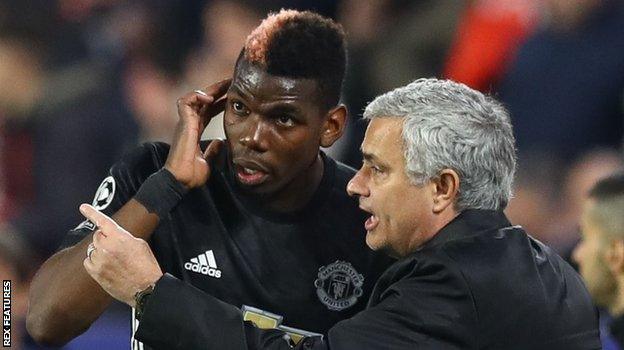
Against Sevilla, Pogba replaced Herrera, who went off injured after 17 minutes, and has started both United's matches since.
What I would say in response to the stories about Pogba being unhappy with his treatment or that his future at United is in doubt, is that he has not reacted to what happened in a negative way.
I judge players by what I see from their body language on the pitch and when Pogba came on against Sevilla after being substituted against Tottenham and then dropped, he was hungry, sharp, put himself about and did not look in any way whatsoever as if he was sulking.
Since then, while he did not put in an outstanding individual performance against Chelsea or Crystal Palace, on both occasions he was part of a United side that came from behind to win.
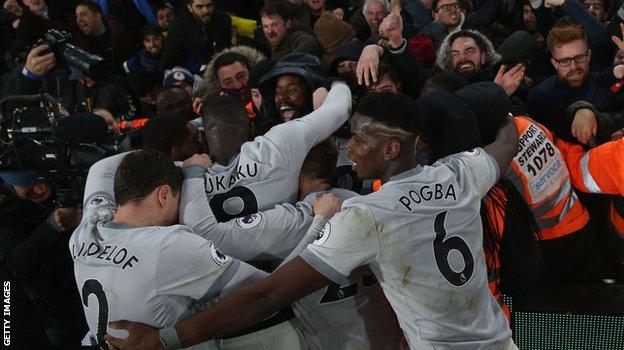
Paul Pogba and Manchester United's players and fans celebrate Nemanja Matic's winner against Crystal Palace. United trailed 2-0 but triumphed 3-2.
It is a compliment to all the United players that they had the desire to fight back, and it does not matter that it was not a perfect performance with Pogba doing lots of silky skills and tricks.
Pogba was part of a team that won, which is what Mourinho wants. He does not care if an individual looks good in a game; he just wants all of his players on board trying to fight and win.
So I do not see it as a bad thing that Pogba did not grab hold of those games himself, although that will happen again, I am sure.
United a much better team with Pogba
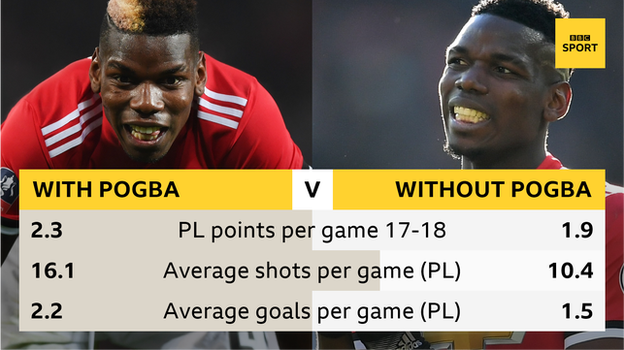
United have a 68.4% win percentage with Pogba in the Premier League in 2017-18. That drops to 60% without him. He missed two months of the season with a hamstring injury before Christmas.
The reason Pogba gets scrutinised so much is because of how much he cost and because people can see potentially how amazing he can be.
That expectation is inevitable with any player who moves for big money but I don't think Pogba has done that badly this season.
If you look beyond Manchester City's season of dominance, United are sitting in second place as the best of the rest and that has a lot to do with Pogba.
When he is in the team, they look a much better side.
Best assists-per-minute ratio in Europe's top five leagues in 2017-18 | ||
|---|---|---|
Player (club) | Assists | Mins/assist |
1. Neymar (PSG) | 13 | 137.5 |
2. Lucas Vazquez (Real Madrid) | 7 | 148.6 |
3. Leroy Sane (Man City) | 11 | 157.1 |
4. Henrikh Mkhitaryan (Man Utd/Arsenal) | 8 | 161.1 |
5. Paul Pogba (Man Utd) | 9 | 173.1 |
For players to have played a minimum of 1,000 minutes in 2017-18. Pogba was ranked 1st on 15 January, before Alexis Sanchez signed from Arsenal. | ||
Recently, he has been criticised for lacking defensive discipline but I don't think that is a natural part of his game, and you are wasting his ability if you are playing him just as a holding player.
Yes, he can still influence games from deep with his passing ability and his strength and his power. But where I want to see Pogba is in a role where he has free rein to go and cause damage and win games for United with his creative ability and his shooting skills.
That will come to fruition soon because of how good he is, and because Mourinho will find the right role for him when he knits his attack together.
Why Pogba is a victim of his own ability
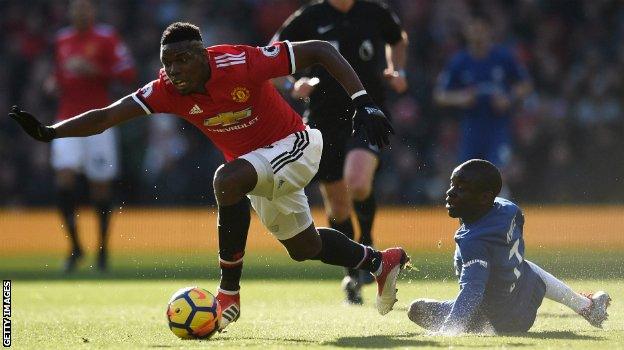
Pogba cost United a then world record fee of £89m when they signed him from Juventus in 2016
In some ways Pogba is a victim of his own ability.
He is so athletic - he can intercept, head the ball, run quickly and tackle. On top of that, he is two-footed, skilful and he can score goals, so he has got everything you need to play in any role in the middle of the pitch, which is obviously a good thing.
But I know as a former midfielder myself that it is difficult when you are asked to do different jobs every week in different situations against different opposition.
Yes, Pogba should be able to do it all because of his ability, but finding your best level is not a case of clicking your fingers.
A good example of that was Pogba's performance in United's 2-0 defeat by Tottenham in January, when he was part of a two-man midfield with Nemanja Matic.
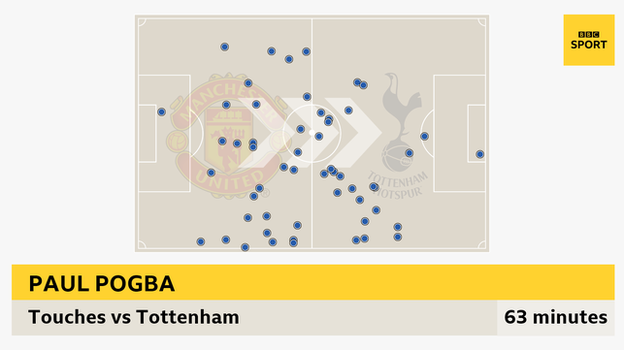
Pogba was substituted after 63 minutes of United's 2-0 defeat by Tottenham at Wembley
Pogba was asked to be patient with his pressing, hold his position and not use up all the energy he has got. That was probably unusual for him, which is why he struggled and vacated the middle too much.
He can get away with not playing the position properly against the lesser clubs because his side are dominating possession, but against good opposition, who find your weaknesses, he will get shown up like he did at Wembley.
What is the solution?
What you should say to Pogba is that you want him to make an impact on the game and he has got the freedom to do that because United have got the personnel around him to fill the holes he leaves.
Even playing him as one of two men in the centre of midfield would work if one of United's wide midfielders is ready to tuck in nice and narrow. Juan Mata, for example, is not a winger so he would do that if he was on the right.
In my time at Liverpool, Steven Gerrard used to go wandering and I would move across to be alongside Dietmar Hamann.
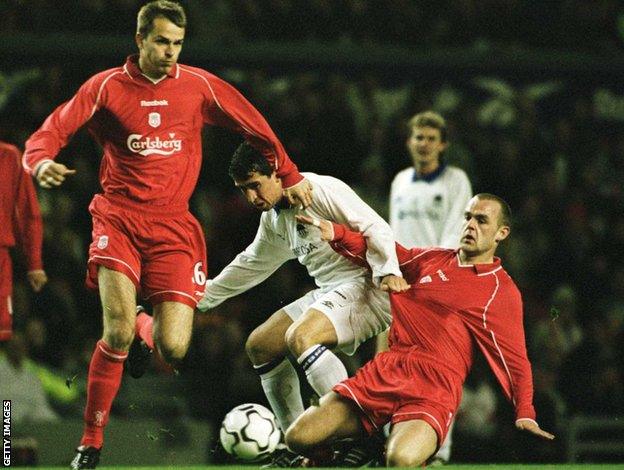
Dietmar Hamann (left) and Danny Murphy (right) played together at Liverpool from 1999 to 2004, when Murphy joined Charlton
Part of that is common sense by the players themselves, but Hamann was probably the best player I learned from when it came to telling his team-mates where they need to be.
When Gerrard and I were roaming forward and playing for ourselves a bit and we were under the cosh, Hamann would say to us, 'Stay there - don't you move. Stay together and let's see this out'.
He would just keep on at you. I would be staying close to him and he would be talking me through when to press and when to drop, using the experience he had gained.
I passed that on when I was at Fulham and played alongside Jimmy Bullard in midfield.
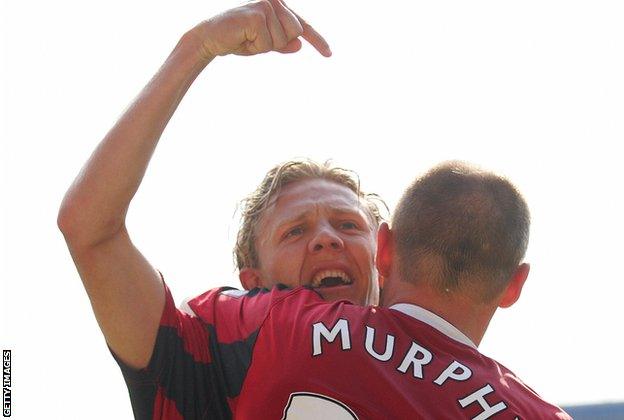
Jimmy Bullard celebrates with Murphy after his goal against Portsmouth secured Fulham's Premier League status on the final day of the 2007-08 season
There were games where Jimmy disappeared on me a little bit, but I liked the fact that he was adventurous and tried to get hold of the game and make things happen.
He wanted the ball all the time, like Pogba does now.
What I used to do sometimes was yell at him and say, 'Listen mate, I need you - just for 10 minutes. Sit with me and help me out because I am getting run ragged here and we need to stay in the game'.
That kind of thing should really be happening all over the pitch with players talking to each other, but I did not see Nemanja Matic doing it with Pogba against Spurs at Wembley.
Pogba needs a platform to keep being unpredictable
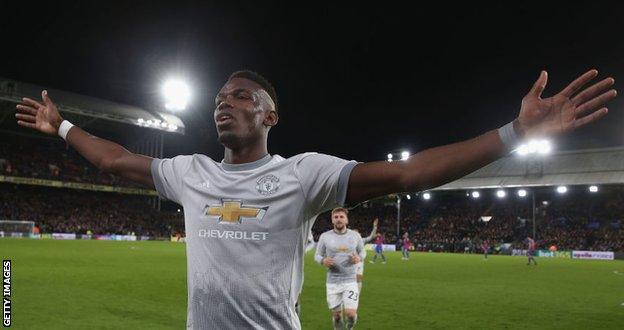
Before United's defeat by Tottenham on 31 January, Pogba had not been on the losing side for 36 consecutive Premier League games. That run included 10 wins and four draws this season.
I see Pogba at his best in a three-man midfield, but that does not have to be with two holding players behind him, with him floating further forward. He has the ability to take the ball off the back four and hit a 70-yard pass with either foot - and you do not want to take that away from him.
What you can do instead is speak to Matic, Scott McTominay or whoever is alongside Pogba in midfield, and get them all to vary their game. They all need to be fluid in there because you cannot be predictable all the time.
The best midfield pairing I came up against was Roy Keane and Paul Scholes at Manchester United, and they mixed it up.
Keane would usually drop off and sit in front of the back four but sometimes Scholes would be deeper than him to get on the ball, with Keane pressing ahead of him.
It is not one rule for one role for Pogba either - it is different rules for different games depending on who is playing around him, and who United are playing against.
There is no need for things to be so rigid that he is not allowed to mix up his game at all, because he should get on the ball where he wants.
Danny Murphy was speaking to BBC Sport's Chris Bevan.